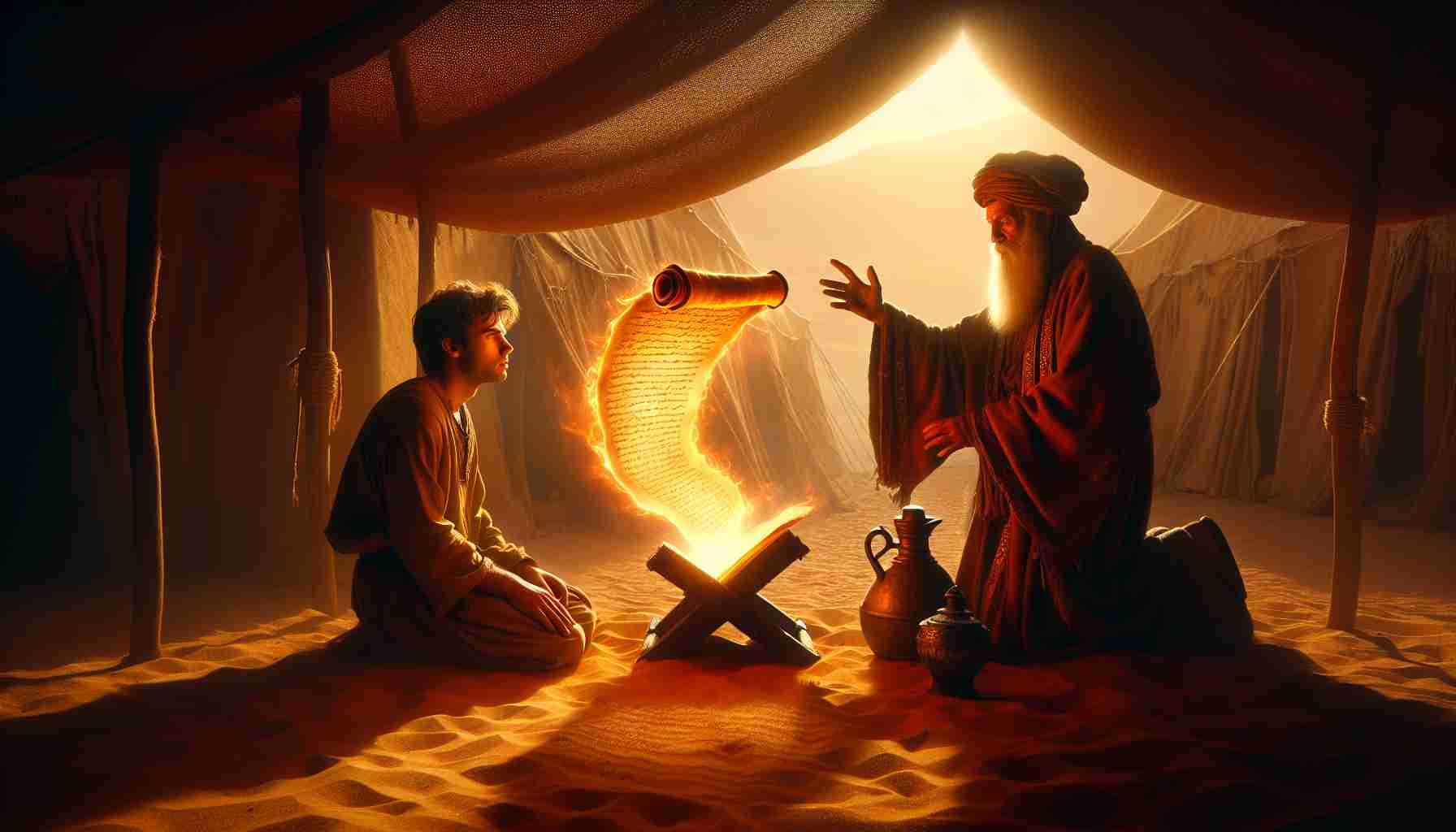

I was the scribe assigned to keep record of the exiles—but I never meant to live among them.
It was the fifth year since King Jehoiachin had been taken by Nebuchadnezzar, the Babylonian king who destroyed Jerusalem and sent us far from the Temple, the heart of our worship. My name isn’t inscribed anywhere, but I wrote what I saw. And what I saw the day Ezekiel received the scroll—I cannot forget.
We were gathered near the Kebar River, scattered families with tents and salted bread, whispering stories of home. I had heard of Ezekiel: the priest who had visions too strange to speak aloud. Some thought him mad; others, touched by God. But what happened that day silenced them all.
I had been recording the names of our elders when I heard a rush of wind, though no breeze stirred the dust. I looked up—and he was already on his knees.
Ezekiel—his eyes wide as though they could see beyond all of us—stared into the empty sky. His hands trembled, raised not in fear, but surrender.
Then he spoke, his voice low but heavy: “The heavens opened. I saw visions of God.”
My heart beat louder. I was taught God no longer spoke since the Temple was destroyed. Why now? Why here?
He told us that God had appeared to him, not in fire or smoke like He had to Moses, but with a scroll. A real, visible scroll. Ezekiel said it was covered with words—inside, outside—all of them lamentations, sorrow, and mourning.
And then, he said God commanded him to eat it.
Eat a scroll?
We stared in disbelief, but Ezekiel nodded slowly, as if the taste still lingered on his tongue. “It was sweet,” he said, “like honey.”
I couldn’t understand. Sweet? Words of destruction and warning?
That night, I couldn’t sleep. The picture of Ezekiel’s face stayed with me. Not mad, no. Changed. Like a man who saw past the veil that blinds the rest of us.
The next morning, he began to speak again. Not with his own words, but with the voice of one burdened by truth. He told us we had to repent—that even though Jerusalem burned, our hearts were still hardened, and we were still a rebellious house.
Some shouted. Some turned away. But I stayed.
If God sent His word into exile, we were not truly abandoned. That scroll fed Ezekiel with strength to speak what no one wanted to hear. He became like the prophets of old—not performing miracles, but bearing God’s message when it was nearly too heavy to carry.
I used to write names and lists. Now, I write the warnings of a man who swallowed the word of God.
And in exile, that became our bread.
I was the scribe assigned to keep record of the exiles—but I never meant to live among them.
It was the fifth year since King Jehoiachin had been taken by Nebuchadnezzar, the Babylonian king who destroyed Jerusalem and sent us far from the Temple, the heart of our worship. My name isn’t inscribed anywhere, but I wrote what I saw. And what I saw the day Ezekiel received the scroll—I cannot forget.
We were gathered near the Kebar River, scattered families with tents and salted bread, whispering stories of home. I had heard of Ezekiel: the priest who had visions too strange to speak aloud. Some thought him mad; others, touched by God. But what happened that day silenced them all.
I had been recording the names of our elders when I heard a rush of wind, though no breeze stirred the dust. I looked up—and he was already on his knees.
Ezekiel—his eyes wide as though they could see beyond all of us—stared into the empty sky. His hands trembled, raised not in fear, but surrender.
Then he spoke, his voice low but heavy: “The heavens opened. I saw visions of God.”
My heart beat louder. I was taught God no longer spoke since the Temple was destroyed. Why now? Why here?
He told us that God had appeared to him, not in fire or smoke like He had to Moses, but with a scroll. A real, visible scroll. Ezekiel said it was covered with words—inside, outside—all of them lamentations, sorrow, and mourning.
And then, he said God commanded him to eat it.
Eat a scroll?
We stared in disbelief, but Ezekiel nodded slowly, as if the taste still lingered on his tongue. “It was sweet,” he said, “like honey.”
I couldn’t understand. Sweet? Words of destruction and warning?
That night, I couldn’t sleep. The picture of Ezekiel’s face stayed with me. Not mad, no. Changed. Like a man who saw past the veil that blinds the rest of us.
The next morning, he began to speak again. Not with his own words, but with the voice of one burdened by truth. He told us we had to repent—that even though Jerusalem burned, our hearts were still hardened, and we were still a rebellious house.
Some shouted. Some turned away. But I stayed.
If God sent His word into exile, we were not truly abandoned. That scroll fed Ezekiel with strength to speak what no one wanted to hear. He became like the prophets of old—not performing miracles, but bearing God’s message when it was nearly too heavy to carry.
I used to write names and lists. Now, I write the warnings of a man who swallowed the word of God.
And in exile, that became our bread.